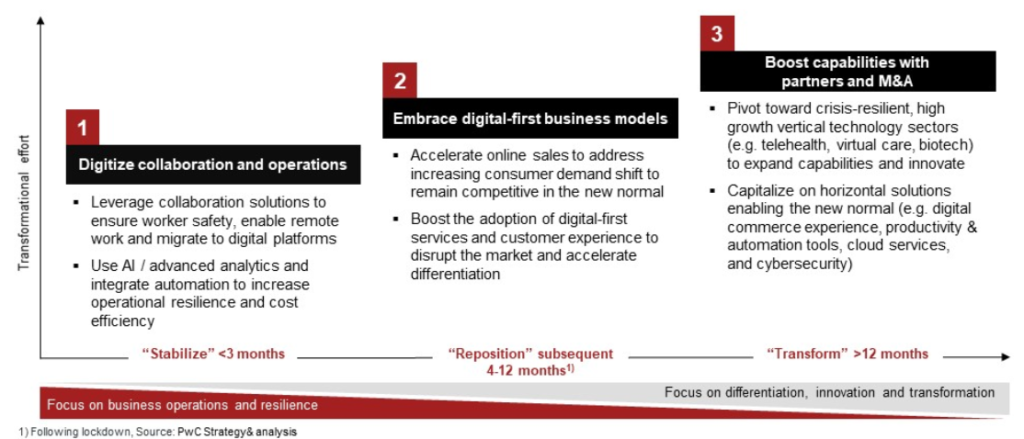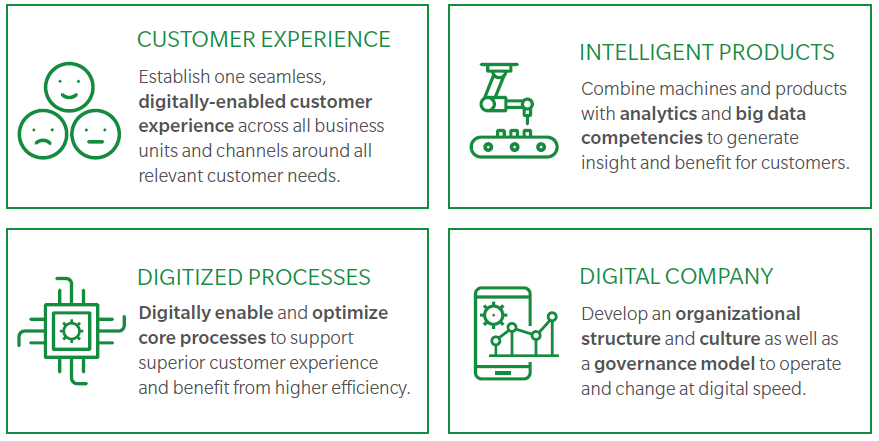Re–imagining the role of technology in a changing business landscape
The societal impact of the COVID-19 pandemic has added greater urgency to the adoption of Digital and technology adoption across all sectors globally, and essentially made it mandatory for governments, corporates, as well as consumers to look at digital channels for accessing goods, delivering services, information, and entertainment. Technology-based businesses have hitherto been alone at the coalface of driving fundamental value-chain shifts and disrupting sectors at scale, but faced with the growing threat, uncertainty, and the long term impact of the SARS-Cov-2 coronavirus and COVID-19 pandemic, all sectors now need to rethink the way they operate in what will become the ‘new normal’. Technology and digital are already being integrated in crisis response, monitoring, tracking and containing the spread of the virus through mapping hotspots, raising awareness, and in delivering welfare to the citizenry. The impact goes deeper. This article explores how business can respond and navigate in this environment.
How will coronavirus affect business?
Both consumers and businesses are altering their behaviors in ways that were previously unimagined, with many of the behavioral shifts expected to persist for years to come. Business leaders must respond and adapt in strategic and structured ways. Roland Berger see three key themes that will be amplified by the coronavirus crisis[1]. The first considers the short-term economic impact and how the pace of recovery will influence investment in innovation, and directly impact the speed of technological change. Reduced demand may lead to shifts in investment priorities resulting in reduced R&D spend. Managing R&D cuts while maintaining key technology and process roadmaps is seen as critical to success. The acceleration of digitization and growth opportunities from leveraging technology on the back of the coronavirus merit consideration. The COVID-19 pandemic has propelled digital transformation, but this pace can only be sustained if technology-based backbone industries keep pace as well.
While many sectors will be hit hard by the COVD-19 crisis,certain sectors should see growth acceleration


Ultimately, how the crisis disrupts global trade will dictate a rethink and potentially a move towards localization of value chains and innovation in various regions and sectors. What is clear is that the COVID-19 pandemic has presented opportunities for digital optimization and transformation. While a multitude of challenges exist, pressing on is a must. To do this, a digital agenda that can drive accelerated transition by strategically concentrating on digitizing collaboration is suggested. This should yeild greater operational resilience and accelerate digital customer service including online customer experience models. Partnering with peers that have stronger and complimentary digital capabilities can enable faster recovery, increase flexibility and provide a competitive edge in innovation and value creation in this new reality characterized by rapidly changing market dynamics[2].
A technology agenda driving the transition to the new normal

A glimpse into this ‘new normal’
Open for business scenarios seem to mislead many into thinking a return to the status quo. The reality couldn’t be more different. Those who will prosper during the impending and protracted recession will have to engender agility, flexibility, and speed in service delivery. This needs to be combined with affordable solutions that are scalable and investment in evolving business models. Business will need to adapt intelligently and become empathetic. Product and process development will shift towards identifying what is most impactful through a deeper understanding of customer needs and examining their journey [3].

Building capacity in local supply chains will be critical as protectionist policies take hold1. These supply chains will need to become more intelligent and resilient to push through periods of uncertainty.
Connecting employees to their networks in the ‘work from home’ normal and giving them access to the data they require will be require investment in unique enterprise platforms that make it efficient to access information quickly, regardless of location while complying with data security requirements.
Social services will not be spared, with education already embracing online learning at an even faster pace leading to the emergence of “education marketplaces”, while augmented reality and virtual reality are seen enabling doctors to treat patients from home and driving costs down. Digital health certificates to enable users to access services like air travel, gyms and other crowded places will bring a dynamic health visa into play[4].
Which way forward?
To chart a way through this minefield requires leaders to take strategic action in different areas including but not limited to:
- Understanding the viability of the current business models,
- Evaluating market dynamics,
- Strategically reviewing and evaluating investment decisions,
- Strategically planning for restrictions on sales and supply chain disruption,
- Familiarization with opportunities, and processes to engage new partners and key stakeholders,
- Finding ways to mitigate protectionism when it arises.
The COVID-19 pandemic and the resultant disruptions have irrevocably altered the digital adoption for consumers, corporates and governments alike, and technology is sure to play an important role in recovery as well. It is imperative for all participants to understand the strategic importance of technology and bring an even stronger digital orientation in product and process design, service and experience design to not only survive, but thrive amidst changing market dynamics[5].
[1] Michael Alexander, Falk Meissner and Wolfgang Bernhart, Scenarios on economic recovery after the coronavirus crisis and the perseverance of globalization, Managing The Coronavirus Crisis, RolandBerger, May 2020, https://www.rolandberger.com/en/Point-of-View
[2] Olaf Acker, Dr. Clement Mengue, and Neil Siri, A digital technology agenda driving an accelerated transition to the new normal, Implications of COVID-19, June 2020, https://www.strategyand.pwc.com/
[3] Juegen Reiner, Florian Deter, and Hendrik Vedder, Preparing for Digital as The New Normal – Digital Transformation of Manufacturing Companies, Oliver Wyman, 2017
[4] Subhankar Pattanayak, 3 Ways Technology Will Shape Up the “New Normal”, May 2020, https://www.business2community.com/business-innovation
[5] P. N. Sudarshan with M. M. Prabhu, Technology As the Way Forward: The New Normal, June 2020, Entrepreneur India, https://www.entrepreneur.com/



